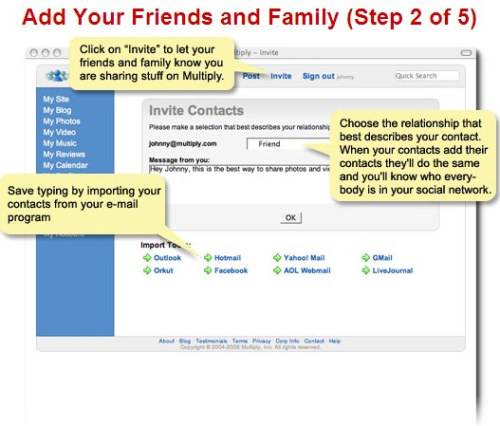Written by Ken Yarmosh and edited by
Richard MacManus.

In the real world we usually keep the professional and personal parts of our lives
separate – e.g. when you meet someone you might hand them your business card, but you
probably won’t tell them about your Star Trek obsession or the details of last night’s
date. From its inception, this level of relational granularity has not been present in
the Web social networking space – your private data often becomes public. This is the reason
why many people have had trouble with their MySpace pages, because what’s displayed on
one’s MySpace page isn’t necessarily a positive thing from a career
perspective.
But what if there was a way to put access controls around your personal details, so
that only people you trust can see it? There’s a new type of SNS arising that enables
exactly that….
“Smart” Social Networks – A Better Way to Connect
Smart social networks are bringing intelligence into the network. Similar to the real
world, they are helping users describe their online relationships. Let’s take a look at
some of today’s evolving “smart” social networks: Facebook, imbee,
Vox, and Mulitply.
While Facebook doesn’t have the reach of MySpace, it’s
actually quite a refined service. Facebook connections are primarily based around
networks. For example, if you went to ABC University, you would initially be placed
within the ABC University network. From there, you can determine who in that network can
see your profile – friends, friends of friends, or everyone – as well as what contact
information is available to each one of those groups.

Unlike other services I’ve seen, Facebook does data mining very well (to be fair,
maybe other services do too – but just don’t share this info). Users can look at the
“Pulse” of their network to see what music, movies, television, books, etc. are most
popular. The “Did you know?” sidebar of the Pulse page also includes interesting stats
such as “x% of ABC University has read the Tipping Point” or “x% of ABC University has
moderate political views.”
Selling Point(s) – Good privacy options, “Pulse” feature
Imbee
Don’t talk to
strangers! How many times did you hear that growing up? Probably one too many. But
that rule hadn’t translated over into social networking until imbee came along.

Imbee is the “first secure social networking and
blogging destination for kids.” Users can’t just connect with each other by browsing
profiles. They need to know the e-mail addresses and/or imbee user names of other imbee
members.
Kids cannot join the site without a credit card being on file (and not necessarily
charged), meaning that someone – probably a parent – is going to have to be involved from
the start. Parents can also control the way their kids interact on the site. New
messages, connections, and other profile changes get put into a queue for parents to
approve – depending on the approval rules put in place.
Selling Point(s) – Kid friendly design, parental approval rules/queue
Vox
Vox is a new venture by Six Apart, which is set to launch
later this year. It is aimed at serving the personal blogging market – and while focused
on blogging, they’ve added a twist by making it feel much more like a social network.

Besides making it easier to integrate web services like YouTube, Flickr, Photobucket,
and others, Vox’s big push is about privacy:
“We’ve learned from the best bloggers in the world – our customers – that there’s a
time for publishing to the world and a time for communicating with just friends and
family. Many people still don’t blog because they don’t want to post private stories and
photos and have them viewed by outsiders.”
Vox users can define those in their “Neighborhood” as a general acquaintance,
“friend”, or “family” connection. Also when creating content (text, photos, audio, video,
etc.), Voxsters can select who can view or comment on it.
Selling Point(s) – Easy integration of web services, can determine
connection types on a case-by-case basis
Multiply
Multiply is an exciting social networking site that
provides an incredible amount of control over how relationships are defined. Not only can
users categorize contacts through three different groups, they also can specify the
particulars of that relationship – husband, roommate, business contact. Even
second-cousin!

Interestingly, Multiply directly targets MySpace in its homepage blurb: “Want to show
your profile to millions of people you don’t know? Use MySpace. Share your photos, video,
music, blogs and more with the people you already know and love: Join Multiply.” Take
that MySpace!
In terms of viewing a Multiply profile, users can choose who has access to it –
“Everyone”, “Your Network”, “Your Contacts”. A network is defined as friends, friend of
friends, friends of those friends, etc. Multiply categorizes relationships by Contacts –
Close, Medium, and Distant. Those outside of Distant are not part or “Your Network”.

One of the nice features about Multiply is that lists can be created based on
Contacts. So if a user wants to send messages to family members or to b-ball buddies,
they can create and save the list for future use.
Selling Point(s) – Granularity of relationship definition, saved
mailing lists
Conclusion
Some people might argue that services like Mulitply limit network growth – but I think
those kinds of features actually make social networking sites better. Users previously
afraid about privacy issues might join something like Vox and parents might actually let
their kids join imbee.
Note that none of these services force users to limit what’s viewable on their
profile, or the content and contact information they share. Relationship/contact
definition is simply a choice. But it’s a choice that makes social networks smarter and
more appealing, meaning that smart social networks have the potential to cater to larger
audiences in the long-run.
Indeed the
MySpaces of the world will probably evolve to be “smart” social networks, making them
even more powerful. You can see this trend already starting to happen in the big social
networks – for example TagWorld allows users to block
users, manage who contacts them, define who can comment on posts/pictures, and remove
their profile from the search index.

Smart social networks may well be the next big thing, as the Web becomes increasingly
personalized as well as social.
Ken Yarmosh blogs at Technosight
and is an Internet/web consultant.










